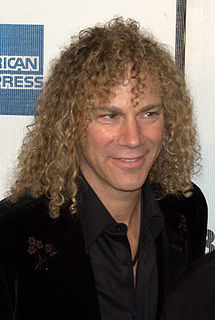A Quote by Nikki Grimes
In 'Out of the Dark,' I'm talking about my own life. I'm not talking as a character or speaking as a character. I was not as free as when I write fiction.
Related Quotes
What's actually amazing is that, after a couple of years of living with characters and writing characters and talking about characters, as we sit in the writers room and break episodes, it strikes you, every once in awhile, that you're talking about a character that's played by the same actor, who you've been talking about forever. We talk about a character dying, so you get emotional, and then you realize, "Oh, but wait, that actor is still on the show."
When you are writing, you have to love all your characters. If you're writing something from a minor character's point of view, you really need to stop and say the purpose of this character isn't to be somebody's sidekick or to come in and put the horse in the stable. The purpose of this character is you're getting a little window into that character's life and that character's day. You have to write them as if they're not a minor character, because they do have their own things going on.
She [Hillary Clinton] knows the people well. I think there is - you know, also talking about breaking down barriers and talking about that, whether we`re talking about that in economic terms. I mean, she`s the only person who has been out there talking about white privilege and talking about sort of the intersectionality of some of these issues.
Okay, this is Fran Lebowitz. She gave an interview once for the Paris Review about trying to write fiction and saying that fiction writers start talking about how characters are talking to them, and it's crazy, she's never had that. And I also thought, I'm never gonna be able to do this, because I didn't feel that for a really long time.
You can write a whole fiction, and you're talking to people who have gone through that, in real life. But the truth of it is that when you're talking to those people, you don't care about your movie anymore. You just want to hear about what they have gone through. You want all of the details. It's amazing.
Trump is an outsider; maybe you don't know. So he is sitting in a room: he is talking business, he is talking politics - in a private room, it's a different persona. When he's out on the stage, he is talking about the kinds of things he's talking about himself; he's projecting an image that's for that purpose.
Maybe I'm perverse, but the question of "rooting" for a character, or setting out to write a character for whom other people will root, has never had anything to do with why I read or write fiction. As long as the writing and story remain alive, intense, invigorating, provoking, the characters can be as demonic or saintly as the author wants.
The first thing that happens is the cleansing of the former character. I don't think a lot of actors talk about it, but there is usually a process where you essentially purge yourself of the character played prior to the movie. Then you want to think about what the character represents, and you write down all of the elements about this character and then take the time to find some synchronicity and start breathing the character.



































